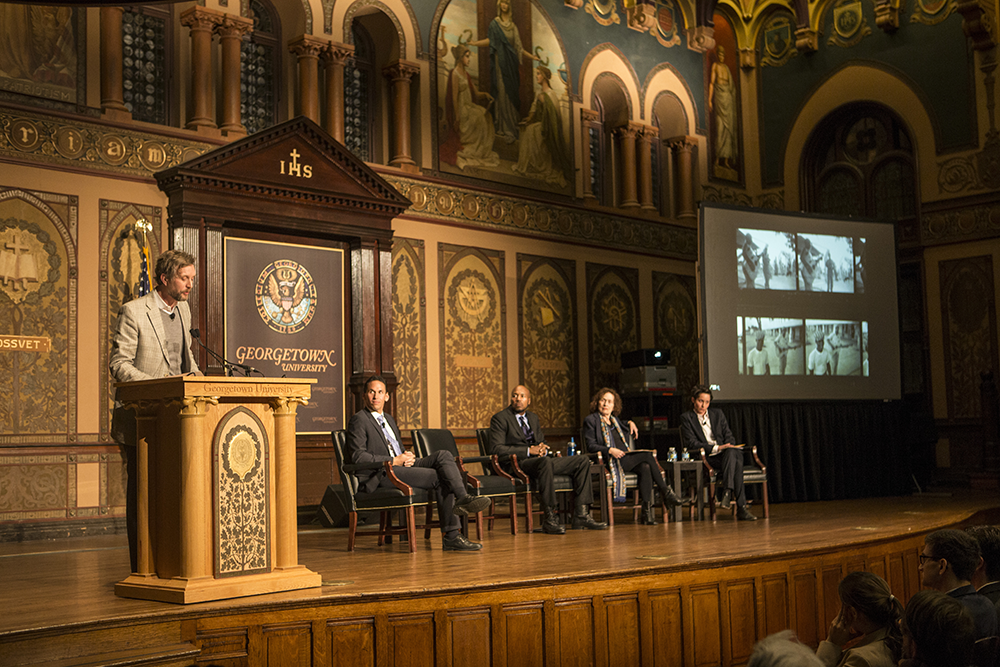
Georgetown officially launched the Prisons and Justice Initiative to examine the problems of mass incarceration in the United States at its inaugural event in Gaston Hall on Tuesday.
The panel discussion, entitled “Reversing the Tide of Mass Incarceration: Prospects for Prison Reform,” featured Georgetown University Law Center professors Paul Butler and Allegra McLeod, music professor Benjamin Harbert and philosophy professor Judith Lichtenberg, who discussed prospects for prison reform in the United States.
The event was introduced and moderated by PJI Director Marc Howard, who will lead the initiative with a faculty board of 14 Georgetown professors and six undergraduate student research assistants. The assistants will work alongside professors as they research and develop means to address racial injustice and advance racial equality.
Howard said that he became interested in the prison system when his high school acquaintance Marty Tankleff was wrongfully convicted of murdering his parents, and was subsequently sentenced to 50 years to life in prison. During Tankleff’s time in prison, Howard visited him and worked to overturn his wrongful conviction. They were eventually successful in the effort and all charges against Tankleff were dropped in 2008.
Along with teaching the course “Prison Reform Project” at Georgetown, Howard has taught at the maximum-security Jessup Correctional Institution in Jessup, Md. for two years. This experience at Jessup has played a large role in driving Howard to lead this new initiative.
“It’s made me think about what our country’s priorities are. Is it worth keeping someone in prison indefinitely when they actually have a lot of potential?” Howard said during the event.
Howard felt the timing was ideal to pitch the idea to Georgetown University President John J. DeGioia, who embraced the initiative.
“The political climate in this country has been changing, where prison reform is maybe the only issue that Republican and Democrats agree upon … There’s a real opening for reform,” Howard said.
During the course of the discussion, Howard outlined three long-term goals for the new initiative. He said that he hopes the initiative will serve as an academic center to present scholarly research related to incarceration and prison reform while also encouraging greater involvement within the Georgetown community through different working groups, events and projects.
He added that he hopes the initiative will foster a greater connection between Georgetown and the rest of Washington, D.C. Howard believes the initiative’s influence will be able to extend far beyond Georgetown’s walls and argued for the need of communication and networking with similar organizations dedicated to the issue.
“We don’t want just to be the campus on a hilltop that’s isolated from the town we live in,” Howard said.
Howard said that although the initiative is unable to support outside organizations financially, it can provide structural resources like facilities for meetings and events.
Howard anticipates that the initiative will gain popularity and host interesting events throughout the semester. On March 22, the initiative will hold “The Truth about False Confessions” panel that includes Tankleff and Raymond Santana, a wrongfully convicted member of the Central Park Five case, a case where individuals suffered from wrongful convictions of sexual assault, robbery, riot and attempted murder. During the upcoming event, panelists will delve into the psychology of false confessions.
Howard hopes that funding will be forthcoming in the future, which will enable the initiative to sponsor sustained programming.
“I’m cautiously optimistic because I know there are a lot of major donors and philanthropists out there that find this issue very compelling. Across the spectrum, a lot of people have realized that things have gone too far,” Howard said.
Harbert said that he is excited about the initiative uniting faculty from various departments. Harbert has studied music in prisons for many years and is currently finishing the book named “Angola Bound: A Comprehensive History of Music at Louisiana State Penitentiary.”
“We’re excited about coming together,” Harbert said. “We’ve been on the fringes of our disciplines for so long.”
Prison Outreach Co-Presidents Maddy Moran (COL ’17) and Jules Kerbs (COL ’17) anticipate collaboration between their organization and the initiative. Prison Outreach is a student-run tutoring program that teaches GED, ESL and creative writing skills to inmates in detention facilities in Alexandria and Arlington, Va.
“While our tutoring program is an important source of educational enrichment for local incarcerated persons, we are glad that PJI will provide a more comprehensive chance for involvement by addressing problems including unjust sentencing, racial disproportionality, and prison violence,” Moran and Kerbs wrote in an email to The Hoya. “We anticipate significant overlap between our organization’s members and those involved with PJI, so we are excited to see how both groups will develop and collaborate in the future.”
Matt Kahn (COL ’17), a research assistant in the initiative, will lead the Georgetown-Jessup Debate Program, where inmates from Jessup prison will develop public speaking skills and work on building logical arguments. The class will consist of lectures taught by Kahn and hands-on learning in which students can participate in debates.
Kahn said in an interview with The Hoya that he believes the class will help the students beyond their time in prison and expects the skills taught will be put into practice, whether the situation is a parole hearing or an interaction with family members upon a prisoner’s release.
“My biggest goal is to try to help the students in my class develop a sense of confidence in themselves,” Kahn said. “Part of my hope is that they will have more confidence, that they will be able to articulate that they have changed.”




















